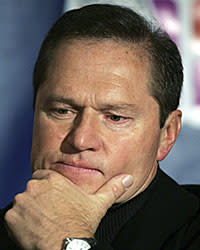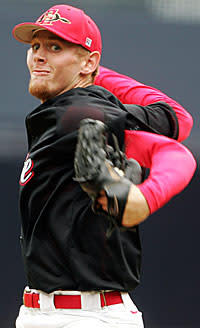What a peach: Boras orchestrates satisfaction
LOS ANGELES – In the hour after Monday night's deadline here, his staff members were scattered amid marker-covered white boards and paperwork pushed aside on the long V-shaped table in the war room of Scott Boras Corp.
They sorted through nourishment that had arrived in square boxes at the front door of the two-story, glass-and-steel building in Newport Beach, Calif., devouring sausage and pepperoni pizzas at the end of one of the more hectic and successful days in the history of their company.

With 77 seconds left before the MLB draft signing deadline, agent Scott Boras had negotiated the largest contract ever for an amateur player.
(Elsa/Getty Images)
The stories of Stephen Strasburg and Dustin Ackley and Donavan Tate and Jacob Turner and LeVon Washington and others surrounded them. They were recorded on those sliding white boards stacked and mounted on two entire walls, every offer and counteroffer there, every contract term agreed upon, dismissed and pending there. A projection system in which three screens carried fingertip access from an expansive in-house database idled.
Lawyers had stood by, as had accountants, and an expert in baseball's collective bargaining agreement. An operator pushed the calls of two or three general managers at a time, and one on the staff was on the line with the players' union for the final hour, because the union needed to hear about any major league contracts, of which there were three (Strasburg, Ackley and Turner).
In a nearby room, the deadline passed, Scott Boras himself telephoned the families of nine young men, many of whom he'd taken into those final hours. Seven had reached agreement. Washington, an infielder taken 30th by the Tampa Bay Rays, had not, and neither had James Paxton, a Kentucky left-hander taken 37th by the Toronto Blue Jays.
Strasburg's contract – for $15.1 million guaranteed over four seasons from the Washington Nationals – had come last, with 77 seconds to spare, and with the most fanfare. The contract was the largest ever for an amateur player. The Seattle Mariners had agreed to pay Ackley $7.5 million guaranteed, the second-largest contract ever for a position player (Mark Teixeira(notes) was first). Turner, a high-school pitcher, could get as much as $7 million from the Tigers. Oklahoma State lefty Andy Oliver went in the second round but got first-round money ($1.495 million), also from the Tigers.
"Then I get to talk to the parents," Boras said Tuesday morning. "I've known them for a long time. There's absolute relief about the direction they're headed, what they've accomplished. It's one of the best parts of the job."
He told them what would be next. He would meet Tate on Tuesday in San Diego, where they would formalize his contract. In the coming days, he told them separately, he'd see them in Oakland (Grant Green), or Milwaukee (Kentrail Davis), or Detroit or D.C. For a few minutes he joined in on every family's celebration.
"They've been waiting for a long time for that moment," Boras said. "It's the start of their dream."
Given a little more than two months since the draft itself, philosophical conversations on slotting and other issues had pretty much died of fatigue long before the 72 hours that led to the deadline. By Friday or Saturday, Boras had an idea which negotiations were sure to go fast and which would run into Monday evening. By then, the sole topic was economic fit. He believed Strasburg would get done, for example, because Nationals GM Mike Rizzo also believed Strasburg was an exceptional talent. That was enough to find common ground, he believed. He thought Ackley would sign in Seattle, because he knew Mariners GM Jack Zduriencik saw and valued talent as he – Boras – did. Same with David Chadd, vice president of amateur scouting for the Tigers.
So, sometime around Saturday morning, Boras stocked up on coffee and his favorite fruits from Melissa's Produce (founders Joe and Sharon Hernandez share a suite at Angel Stadium and have season seats at nearby Dodger Stadium), strapped in and, as he said, "stayed glued to my chair for 72 hours." Swirling nearby, his strategic draft team of at least a dozen (headed by former big-league righty Scott Chiamparino), which included three lawyers and a statistics staff. A staffer took Boras from call to call, from team to team, without Boras ever actually dialing a phone, that seamless.
Much of the attention was on Strasburg, of course. He had the 100-mph fastball. He had the stupid slider. He was going to save baseball in D.C. He was going to get $50 million and use the reflecting pool as an ashtray for his victory cigar.
"The idea that the bonus structure was new and the talent level was extraordinary," Boras said. "Everything about the negotiations was a story in itself because it represented new boundaries."

Stephen Strasburg signed a four-year, $15.1 million deal with the Washington Nationals.
(Lenny Ignelzi/Associated Press)
The negotiations began to remind Boras of those for free agents Greg Maddux(notes) and Alex Rodriguez(notes).
"There was no market comparison," he said.
Then there was the usual backlash.
"For some reason," he said, "the public always seems to take the side of the team and not the player."
Or the agent. Particularly not the agent. Particularly not this agent.
"I hadn't noticed," he said, laughing.
By 6 p.m. in the war room, three hours from the deadline, there were multiple possible deals being batted between Washington D.C. and Newport Beach. More money (as much as $20 million) over more years. Less money over fewer years. Different amounts of guaranteed money. Potential opt outs. Recapture of money if there was an opt out. It went on and on.
Boras sustained himself on peaches. The clock wound toward the deadline. With about six minutes left, he got on the phone again – maybe for the 10th or 11th time Monday – with Rizzo.
"So, what's up?" Boras asked him. "How ya doin'? What do you think you'll do for lunch tomorrow?"
Playing with Rizzo, Rizzo getting the joke, both knowing they didn't have time for this.
"There is a moment," Boras said, "where everybody feels their needs are taken care of."
It arrived with a full 77 seconds left. The Nationals notified the commissioner's office. Boras nodded to his designated staffer, who notified the union. Nationals president Stan Kasten later told reporters in Washington, "We didn't even need that last minute."
By 11 p.m., Boras had left behind the pizza party. He was being driven north to Pasadena, where he'd join another client, Matt Holliday(notes), and his wife, Leslee, at their hotel. He arrived to find them in a courtyard with Mike Fiore, Boras' vice president and a 12-year employee. The four of them caught up. They talked free agency. Approaching 2 a.m., Boras was the passenger as Fiore drove them away from the hotel, through the streets of Pasadena.
"Hey," Boras suddenly said, "you're not going to stop?"
"Where?" Fiore asked.
"Winchell's. You're not going to stop?"
Fiore turned the car around. A man can have only so many peaches. ("By the way," Boras said, "Mike was not disappointed with the Winchell's decision." Said Fiore: "I would not have stopped.") So it was with his maple bar (a dietary exception he normally reserves for Sundays) and cup of coffee in hand that Boras began to let go of the 2009 draft. And began to think about Bryce Harper and Anthony Ranaudo.
Harper, a catcher, is the Las Vegas high-school phenom. Ranaudo is a 6-foot-7 right-hander at LSU.
That's next year's draft.
